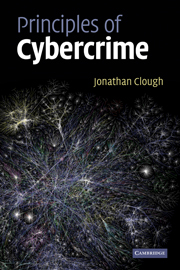Book contents
- Frontmatter
- Contents
- Preface
- Acknowledgements
- List of abbreviations
- Table of cases
- Table of legislation
- PART I Introduction
- PART II Computer as target
- PART III Fraud and related offences
- 7 Fraud
- 8 Criminal copyright infringement
- 9 ‘Spam’
- PART IV Content-related offences
- PART V Offences against the person
- PART VI Jurisdiction
- Bibliography
- Index
7 - Fraud
Published online by Cambridge University Press: 05 June 2012
- Frontmatter
- Contents
- Preface
- Acknowledgements
- List of abbreviations
- Table of cases
- Table of legislation
- PART I Introduction
- PART II Computer as target
- PART III Fraud and related offences
- 7 Fraud
- 8 Criminal copyright infringement
- 9 ‘Spam’
- PART IV Content-related offences
- PART V Offences against the person
- PART VI Jurisdiction
- Bibliography
- Index
Summary
Fraud online
Request for urgent assistance
I got to know of you in my search for a reputable person/Company to assist in an urgent business deal requiring utmost trust and confidentiality. I am BARR.(HON.) AZUBUIKE, an Attorney and close confidant of MRS. MARYAM ABACHA, the former first lady and wife of the late GEN. SANI ABACHA, the former head of state and commander in chief of the armed forces of the Federal Republic of Nigeria.
No scam is more emblematic of online fraud than the so-called Nigerian mail frauds. There can hardly be a person with an email account who has not received one of these messages or its many variants. A form of what is known as an ‘advance fee’ fraud, the unsolicited message typically asks the recipient to help the sender to arrange for a large amount of currency to be illegally moved out of the country. For this, they need the recipient's bank account details and in return will pay a hefty commission. Once the recipient indicates interest in the proposal, they find that payment of upfront funds is required, ostensibly to deal with bribes or red tape, before the money can be released. Of course, the promised commission never eventuates and the victim's money is lost. In some cases, persuasion is replaced with intimidation and there are reports of victims being threatened, kidnapped and even killed while seeking to recover their funds.
- Type
- Chapter
- Information
- Principles of Cybercrime , pp. 183 - 220Publisher: Cambridge University PressPrint publication year: 2010



